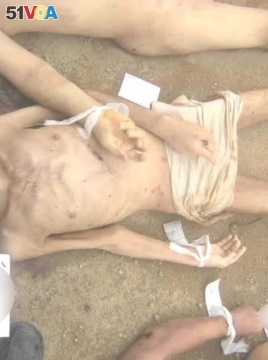October 15,2014
WASHINGTON— Shocking photographs purporting to show Syrian torture victims are on display at the U.S. Holocaust Memorial Museum in Washington. The museum says the graphic images are among thousands of photographs recently smuggled out of Syria by a military policeman-turned-defector.

The images are horrifying. The semi-naked, emaciated bodies show signs of torture: severe bruises, cuts and burn marks.
The U.S. Holocaust Memorial Museum says these are just a small sample of about 55,000 photographs taken by Syrian military police between 2011 and 2013 showing victims tortured by the government of Syrian President Assad.
The images are said to show the bodies of about 11,000 civilians believed to have been killed at government detention centers.
They were given to the museum by a Syrian military photographer-turned-defector who goes by the name Caesar, who smuggled them out of Syria on digital drives at great peril.
According to the museum, forensic and international law experts have authenticated the pictures and found the defector’s story credible. The FBI is examining the photos.
Cameron Hudson, the policy director for the museum's Center for the Prevention of Genocide, said Caesar took a great risk to bring the photos to light.
"When he saw the pictures of [the] elderly, children, women, he knew that these were not battlefield deaths, and he knew that he could no longer accept the official story that the Assad regime was putting out there… At great personal risk to himself, he spirited out more than 55,000 of these photographs to show the world what he was already witness to," Hudson said.
The Syrian government claims the photos are not credible, and attributes them to battlefield deaths, but the museum believes in their authenticity.
"When you see emaciation, when you see very clear, visible signs of torture, you understand that that didn't happen in a combat setting," said Hudson.
Hudson said the museum has a mandate to alert the world about crimes against humanity. They hope this exhibit will help ensure the conflict in Syria and its people are not forgotten.